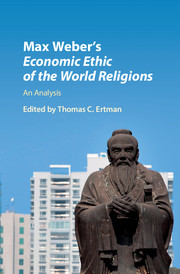52 results
Copyright page
-
- Book:
- Max Weber's <I>Economic Ethic of the World Religions</I>
- Published online:
- 28 April 2017
- Print publication:
- 24 March 2017, pp iv-iv
-
- Chapter
- Export citation
1 - Max Weber’s The Economic Ethic of the World Religions
- from Part I - Introduction
-
-
- Book:
- Max Weber's <I>Economic Ethic of the World Religions</I>
- Published online:
- 28 April 2017
- Print publication:
- 24 March 2017, pp 3-36
-
- Chapter
- Export citation
Index
-
- Book:
- Max Weber's <I>Economic Ethic of the World Religions</I>
- Published online:
- 28 April 2017
- Print publication:
- 24 March 2017, pp 356-358
-
- Chapter
- Export citation
Part I - Introduction
-
- Book:
- Max Weber's <I>Economic Ethic of the World Religions</I>
- Published online:
- 28 April 2017
- Print publication:
- 24 March 2017, pp 1-36
-
- Chapter
- Export citation
Part VI - Conclusion
-
- Book:
- Max Weber's <I>Economic Ethic of the World Religions</I>
- Published online:
- 28 April 2017
- Print publication:
- 24 March 2017, pp 347-355
-
- Chapter
- Export citation
Contributors
-
- Book:
- Max Weber's <I>Economic Ethic of the World Religions</I>
- Published online:
- 28 April 2017
- Print publication:
- 24 March 2017, pp vii-vii
-
- Chapter
- Export citation
13 - Living and Dead in Max Weber’s Economic Ethic of the World Religions
- from Part VI - Conclusion
-
-
- Book:
- Max Weber's <I>Economic Ethic of the World Religions</I>
- Published online:
- 28 April 2017
- Print publication:
- 24 March 2017, pp 349-355
-
- Chapter
- Export citation
Acknowledgments
-
- Book:
- Max Weber's <I>Economic Ethic of the World Religions</I>
- Published online:
- 28 April 2017
- Print publication:
- 24 March 2017, pp viii-viii
-
- Chapter
- Export citation
Part III - Reassessing Weber on China
-
- Book:
- Max Weber's <I>Economic Ethic of the World Religions</I>
- Published online:
- 28 April 2017
- Print publication:
- 24 March 2017, pp 85-172
-
- Chapter
- Export citation
Part V - Reassessing Max Weber on Ancient Israel
-
- Book:
- Max Weber's <I>Economic Ethic of the World Religions</I>
- Published online:
- 28 April 2017
- Print publication:
- 24 March 2017, pp 267-346
-
- Chapter
- Export citation
Abbreviations of Weber’s Works
-
- Book:
- Max Weber's <I>Economic Ethic of the World Religions</I>
- Published online:
- 28 April 2017
- Print publication:
- 24 March 2017, pp ix-x
-
- Chapter
- Export citation

Max Weber's Economic Ethic of the World Religions
- An Analysis
-
- Published online:
- 28 April 2017
- Print publication:
- 24 March 2017
Part IV - Reassessing Max Weber on India
-
- Book:
- Max Weber's <I>Economic Ethic of the World Religions</I>
- Published online:
- 28 April 2017
- Print publication:
- 24 March 2017, pp 173-266
-
- Chapter
- Export citation
Part II - Weber’s The Economic Ethic of the World Religions in the Context of his Overall Intellectual Project
-
- Book:
- Max Weber's <I>Economic Ethic of the World Religions</I>
- Published online:
- 28 April 2017
- Print publication:
- 24 March 2017, pp 37-84
-
- Chapter
- Export citation
Contents
-
- Book:
- Max Weber's <I>Economic Ethic of the World Religions</I>
- Published online:
- 28 April 2017
- Print publication:
- 24 March 2017, pp v-vi
-
- Chapter
- Export citation
2 - Otto Hintze, Stein Rokkan and Charles Tilly’s Theory of European State-building
- from Part I - Lineages
-
-
- Book:
- Does War Make States?
- Published online:
- 16 February 2017
- Print publication:
- 02 March 2017, pp 52-70
-
- Chapter
- Export citation
1 - Opera, the state and society
- from Part One - Institutions
-
-
- Book:
- The Cambridge Companion to Opera Studies
- Published online:
- 05 December 2012
- Print publication:
- 18 October 2012, pp 25-52
-
- Chapter
- Export citation
The State of the State - Gianfranco Poggi; The State. Its Nature, Development and Prospects. (Stanford: Stanford University Press, 1990. Pp. vii, 214. $29.50. $9.95, paper.)
-
- Journal:
- The Review of Politics / Volume 54 / Issue 4 / Fall 1992
- Published online by Cambridge University Press:
- 05 August 2009, pp. 712-714
-
- Article
- Export citation
2 - Western European Party Systems and the Religious Cleavage
-
-
- Book:
- Religion, Class Coalitions, and Welfare States
- Published online:
- 28 January 2010
- Print publication:
- 06 April 2009, pp 39-55
-
- Chapter
- Export citation
A Noble Substitute for Politics - About Wolf Lepenies, The Seduction of Culture in German History (Princeton University Press, 2006).
-
- Journal:
- European Journal of Sociology / Archives Européennes de Sociologie / Volume 48 / Issue 3 / December 2007
- Published online by Cambridge University Press:
- 17 April 2008, pp. 507-509
-
- Article
- Export citation



